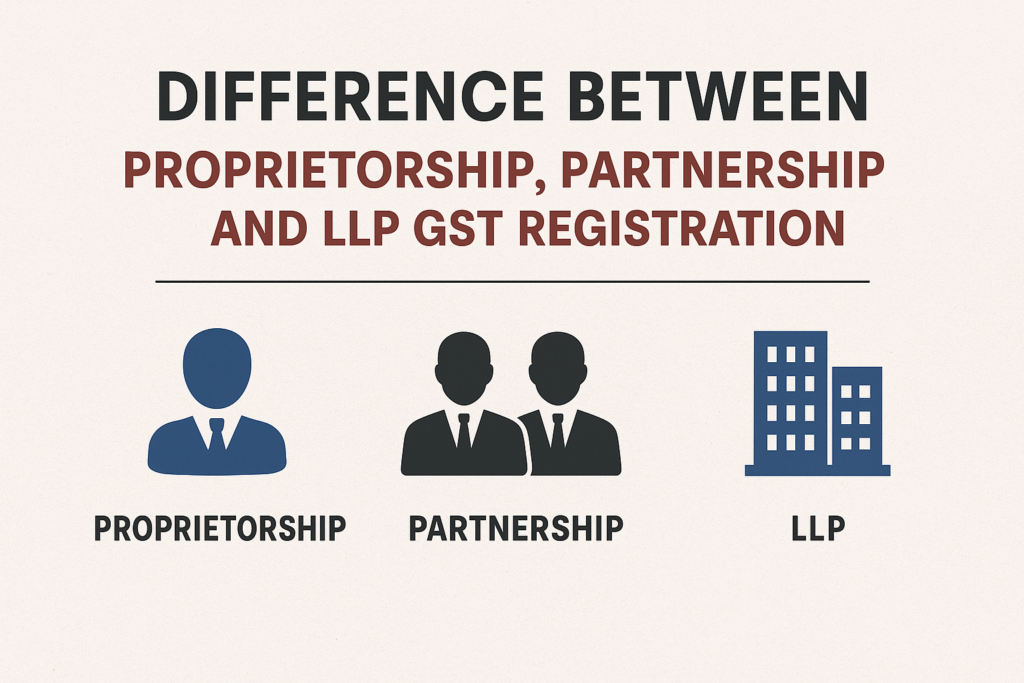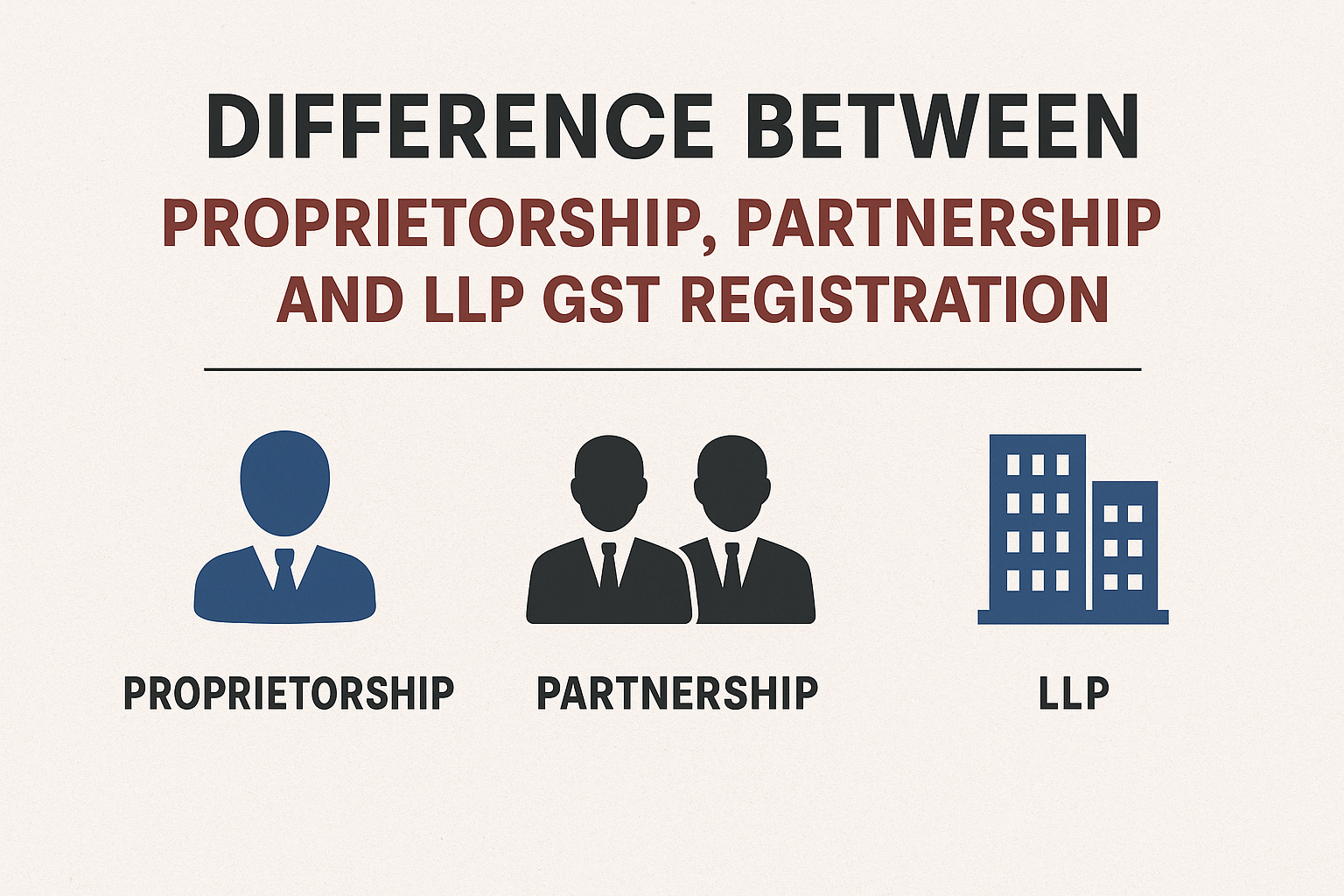
Difference Between Proprietorship, Partnership and LLP GST Registration

difference between proprietorship partnership and LLP GST registration
Introduction – Why Business Structure Matters for GST
Choosing the right business structure is one of the most important decisions before applying for GST registration in India. The difference between proprietorship, partnership and LLP GST registration goes beyond documents—each structure impacts tax liability, compliance, ownership, accountability, and legal protection.
With increasing regulations under the GST law, business owners in Patna, Bihar often seek clarity on which structure is best suited for their trade or service activity. This guide explains the legal, tax and compliance distinctions under GST in a simple but authoritative manner.
Overview of GST Registration in India
The GST law mandates registration based on turnover and nature of business.
Key legal provisions:
Section 22, CGST Act, 2017 – Liability to register
Section 25, CGST Act, 2017 – Procedure for registration
Rule 8–10, CGST Rules, 2017 – Application process
Notification No. 10/2017 – Central Tax – Threshold exemptions
GST registration provides:
Legal recognition
Input tax credit
Inter-state supply permission
Compliance responsibilities (GSTR-1, GSTR-3B, e-invoice, etc.)
Proprietorship GST Registration
Eligibility and Documents Required
A proprietorship is the simplest business structure, where the individual and business are legally the same entity.
Eligibility:
GST registration is required when turnover crosses:
₹40 lakh for goods
₹20 lakh for services
Documents:
PAN & Aadhaar of proprietor
Photograph
Address proof of business place
Bank account proof
Electricity/utility bill or rent agreement
Compliance & Advantages
Compliance:
Monthly/quarterly GST returns
Maintaining sales & purchase records
Timely payment of tax
Advantages:
Lowest documentation requirement
Simple registration and closure
Ideal for freelancers, traders and micro-businesses
Partnership Firm GST Registration
Process and Key Legal Provisions
Partnership firms are governed by the Partnership Act, 1932. Two or more persons join together with a profit motive.
Key points:
Firm must have a PAN (distinct from partners)
GSTIN is issued in the firm’s name
One partner signs as the Authorized Signatory
Documents:
Partnership deed
PAN of firm
Aadhaar/PAN of partners
Business address proof
Authorization letter
Benefits and Limitations
Benefits:
Shared resources and risk
Simple compliance structure
Easy to form and operate
Limitations:
Unlimited liability of partners
No separate legal identity
Higher compliance than proprietorship
LLP GST Registration
A Limited Liability Partnership is governed by the LLP Act, 2008 and enjoys separate legal identity with limited liability.
Step-by-Step Procedure
Obtain LLP PAN
Prepare LLP Agreement
Open bank account
Apply online for GST registration (Rule 8–10)
Submit documents & KYC
Complete Aadhaar e-KYC verification
Receive GSTIN & login credentials
Comparison with Partnership
| Feature | Partnership Firm | LLP |
|---|---|---|
| Legal Status | Not separate | Separate legal entity |
| Liability | Unlimited | Limited |
| Registration | Optional | Mandatory via MCA |
| Compliance | Moderate | Higher |
| Funding acceptance | Difficult | Easier |
| GST formalities | Regular | Regular but more organized |
Key Differences Between Proprietorship, Partnership & LLP under GST
Table – Entity-wise Comparison (Ownership, Liability, Tax Filing)
| Particulars | Proprietorship | Partnership | LLP |
|---|---|---|---|
| Legal Status | Not separate | Not separate | Separate |
| Liability | Unlimited | Unlimited | Limited |
| GST Registration | In proprietor’s name | In firm name | In LLP name |
| Compliance | Low | Medium | Medium–High |
| Conversion Process | New entity required | New entity required | Migration allowed |
| Suitable For | Traders, freelancers | SMEs, family business | Startups, professional services |
Which Structure Should You Choose? (Practical Scenarios)
If you want simplest compliance: choose Proprietorship
If you want shared ownership and moderate compliance: choose Partnership
If you want legal protection and scalability: choose LLP
If you plan to raise funds, onboard professionals, or sign large contracts: LLP is strongly advisable
Practical Case Study – Patna-Based Trader’s Journey
A Patna-based textile trader initially operated as a sole proprietor. As turnover increased, he onboarded two partners and converted into an LLP to limit personal liability.
GST Impact:
A new GST registration was obtained for the LLP.
Input tax credit was transferred through proper documentation.
Compliance responsibilities increased but business became legally stronger.
This example shows how business growth often demands structural changes.
Common Mistakes in GST Registration for Businesses
Using residential address without proper proof
Not updating structure changes (e.g., conversion to LLP)
Selecting wrong business activity (HSN/SAC)
Incorrect authorized signatory details
Not verifying email/mobile OTP promptly
Missing post-registration compliance
Conclusion – Expert Advice for New Entrepreneurs
Choosing the right entity type before GST registration is crucial for business stability and compliance. Differences among proprietorship, partnership and LLP GST registration directly impact risk, cost, and long-term growth.
For personalized evaluation, consult a qualified tax professional in Bihar.
Call-to-Action (CTA)
Need help choosing the right business structure for GST? Contact Bihar Tax Consultant for expert registration and compliance support today.
Frequently Asked Questions (FAQs)
Is GST registration mandatory for all proprietorships?
Only if annual turnover exceeds ₹40 lakhs (₹20 lakhs for services).
Can a partnership firm and LLP have the same GSTIN?
No. Each legal entity requires a unique GSTIN.
What is the main difference between partnership and LLP for GST?
LLP has separate legal status; partners’ liability is limited.
Can I convert my proprietorship GST registration to LLP?
Yes, but a new GST registration is required under the new entity.
Which is better for startups—LLP or proprietorship?
LLP offers liability protection and easier funding options.
Do LLPs have to file GST returns every month?
Yes, depending on turnover; GSTR-1 and GSTR-3B are mandatory.
Can two partners use the same GST number?
No, GSTIN is tied to the registered entity, not individuals.
What are the penalties for not registering under GST?
Penalty = 10% of tax due (minimum ₹10,000) or 100% for fraud cases.
Is PAN mandatory for GST registration?
Yes, PAN is compulsory for all types of entities.
Can I get GST registration without a business address?
No, proof of business place is required for verification.
References (Authoritative Sources)
GST Portal – gst.gov.in
CBIC – cbic.gov.in
MCA Portal for LLP/Partnership – mca.gov.in
CGST Act & Rules – indiankanoon.org
Central Tax Notifications – cbic.gov.in
Author Bio
About the Author – Advocate Tabish Ahmad
Advocate Tabish Ahmad (B.A. LL.B., LL.M., Diploma in Cyber Law – GLC Mumbai) is a Certified Cyber Law Practitioner and practising Advocate at the Patna High Court. He specializes in Cyber Crime, GST Litigation, and Tax Appeals, with extensive experience in representing clients before judicial and quasi-judicial forums.
He serves as President of the Cyber Lawyers Association and is a Member of the Advocates’ Association, Patna High Court. As a Mentor at the Indian Tax Academy and JurisCrack, he guides young lawyers and students in cyber and tax law practice.
Author of several books on Cyber Crimes, Taxation, and GST, Advocate Tabish Ahmad is recognized for his practical insights on digital law, data privacy, and cyber fraud defence.

Advocate Tabish Ahmed
